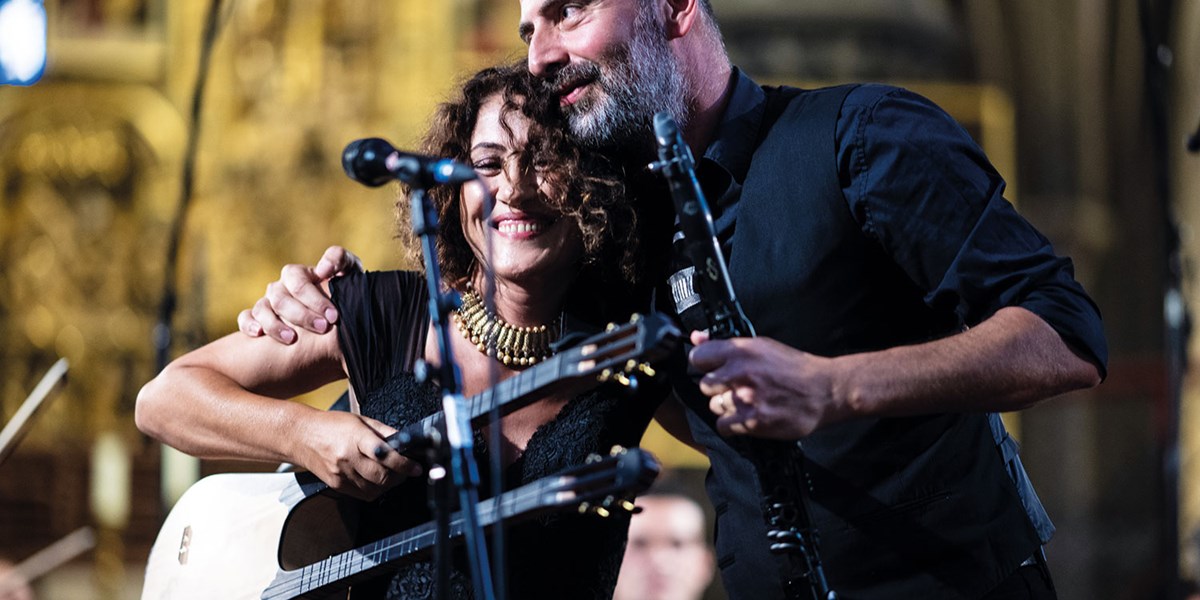Wednesday, August 28, 2024
20 Years of Morgenland
Simon Broughton visits Morgenland Festival in Germany for an opening concert celebrating 20 years of an event which has provided a vital showcase for many artists from the Middle East and North Africa

Aynur and Kinan Azmeh (Liudmila Jeremies)
There was quite a line-up on August 2 in St Marien – the oldest church in the heart of Osnabrück, Germany – for the opening concert of Morgenland Festival, which was celebrating its 20th anniversary. Performers included singers Dima Orsho and Ibrahim Keivo, both from Syria, as well as Syrian clarinettist Kinan Azmeh, singing and playing love songs in Kurdish, Armenian and Arabic. These performers, dubbed the Morgenland All Star Band, are regulars at the festival and the profile of all of them has certainly been raised by the event, which specialises in music from the Middle East and North Africa.
The super-reverberant acoustics of the large 15th-century church were a challenge, the solo voice of Orsho, with red hair and dress to match, echoing throughout the building. Her notes were picked up by Kinan Azmeh on clarinet who knew exactly how to handle the acoustics and how much or how little to play, not making it too busy and keeping the plaintiveness of her vocal lines.
Ibrahim Keivo started quietly, but he’s got an irrepressible energy and spirit, which kicked in when the percussion started and he also picked up his plucked buzuq, held so high it almost hid his face. “Although it’s a bit nostalgic, for the opening concert I thought why not bring our old friends together to celebrate 20 years,” said artistic director Michael Dreyer.
After the mélange that opened, the second part of the concert featured individual artists accompanied by the Morgenland Chamber Orchestra featuring musicians from countries all across the Middle East. “It was created in 2009,” notes Dreyer, regarding the ensemble, “as a kind of response to Barenboim’s West-Eastern Divan Orchestra. He brings together Arab and Jewish musicians, but they play Brahms and Schubert. Why not play music from the region?” The orchestra lent weight to the performances, but much of the detail was lost in the acoustics, particularly during the faster sections.
Kurdish singer Aynur Doğan – who’s appeared many times at the festival – performed ‘Delalê’, a song that is both declamatory and defiant. She accompanied herself on a custom-made double-necked tanbur, devised so she can play in several different keys, along with Kinan Azmeh, whose clarinet cut through the mix with a trumpet-like sound. As with Aynur’s voice, it ended with the softest breath.
Dreyer, who is standing down as artistic director after this year, said the opening was “kind of anachronistic” because the festival needs to move on. So many of the subsequent concerts featured young musicians around 20 years old, the same age as the festival. The second night was called Young Morgenland: Yerevan and featured five traditional musicians from the Yerevan Conservatoire put together by Levon Eskenian of the excellent Gurdjieff Ensemble. They were performing together as a group for the first time. In the super clear acoustic of the stone-clad Lagerhalle, the musicians played kamancheh fiddle, oud, duduk and dhol drum while Tatev Hakobyan sang and played kanun zither. There were spiritual pieces, traditional tunes by the 18th-century Sayat Nova, plus lively Armenian folk dances to finish. It certainly showed that the future of Armenian traditional music is in safe hands.
This article originally appeared in the October 2024 issue of Songlines. Never miss an issue, read the magazine online – subscribe today: magsubscriptions.com

